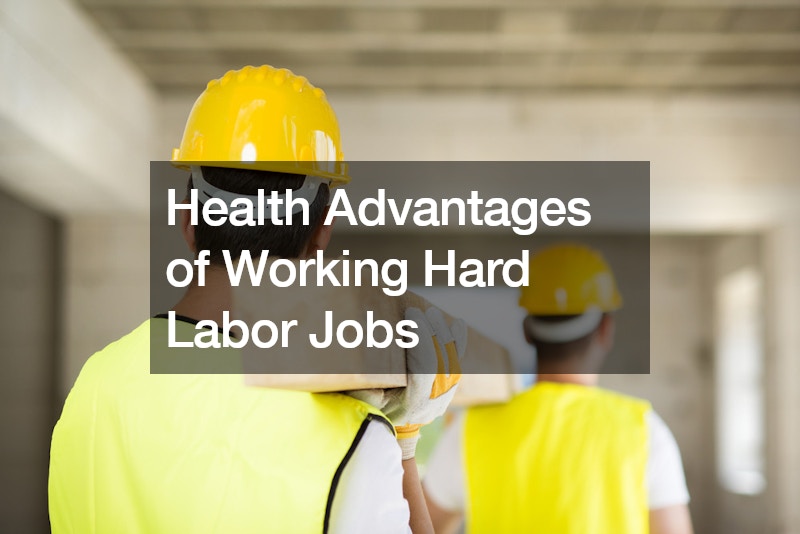Working hard labor jobs is often associated with physical exertion and demanding tasks that require strength and endurance. However, these jobs also offer numerous health benefits that contribute to overall well-being. In this article, we will explore the various ways in which hard labor jobs can positively impact both physical and mental health, as well as their long-term effects on overall health. Whether you work for a flood damage repair company, pool remodeling company, fence company, or one of the many in the high demand paving companies, you put your body through a lot of stress, but this also comes with benefits. Check it out!
Benefits for Physical Health
Improved Strength and Endurance
One of the key benefits of working hard labor jobs is the improvement in strength and endurance. Constant physical activity, such as lifting heavy objects and engaging in demanding tasks, helps develop muscle strength and increase stamina.
Additionally, the cardiovascular demands of hard labor jobs can lead to improved heart health and overall fitness levels. This can result in a decreased risk of obesity and other weight-related health issues.
Furthermore, the physical nature of these jobs often requires workers to engage in repetitive movements and activities, which can help enhance flexibility and joint health in the long run.
Mental Health Benefits
Stress Relief through Physical Activity
Physical activity has been proven to be a significant stress reliever, and working hard labor jobs can provide a natural outlet for stress relief through physical exertion. The release of endorphins during physical activity can help alleviate feelings of anxiety and tension.
Engaging in physical tasks can also contribute to a sense of accomplishment and pride, boosting self-esteem and confidence. This can lead to a more positive outlook on life and a reduced risk of developing mental health issues such as depression.
Moreover, the sense of camaraderie and teamwork often found in hard labor jobs can foster social connections and provide emotional support, further enhancing mental well-being. Additionally, a lot of these jobs involve farming and animals. For example, if you work creating aluminum cattle trailer, you’ll likely be exposed to these animals, which is a connection that can help boost your mental health as well!
Impact on Overall Well-being
Sense of Accomplishment
Completing physical tasks in hard labor jobs can provide a profound sense of accomplishment and fulfillment. The tangible results of one’s efforts can boost motivation and drive, leading to increased satisfaction and happiness in both work and personal life.
In addition, the physical challenges posed by hard labor jobs can help individuals push past their limits and discover a newfound sense of resilience. This can translate into improved problem-solving skills and a higher tolerance for adversity.
Overall, the sense of achievement gained from overcoming physical challenges in hard labor jobs can contribute to a greater sense of purpose and well-being, both in the workplace and beyond.

Rehabilitation and Recovery
Physical Therapy Benefits
Hard labor jobs can also serve as a form of physical therapy for individuals recovering from injuries or seeking to improve their mobility. The repetitive movements and physical demands of these jobs can help strengthen muscles and improve range of motion.
Engaging in hard labor tasks can assist in speeding up the recovery process by promoting blood circulation and reducing stiffness in injured areas. This can help individuals regain functionality and return to their normal activities more quickly.
Furthermore, the physical nature of hard labor jobs, like residential movers, can help individuals build resilience and strengthen their bodies, making them less prone to future injuries and enhancing overall physical well-being.
Long-term Health Effects
Reduced Risk of Chronic Diseases
Regular engagement in hard labor jobs can have a positive impact on long-term health by reducing the risk of developing chronic diseases. The physical activity involved in these jobs can strengthen the heart and lower the risk of cardiovascular issues. IF you’re someone laying prestressed concrete all day, you’re simultaneously building muscle while helping bring a customer’s vision to life!
Additionally, the calorie-burning nature of hard labor tasks can help prevent obesity and reduce the risk of diabetes. The combination of physical exertion and a healthy lifestyle can contribute to a decreased likelihood of developing certain cancers as well.
By incorporating hard labor jobs into a daily routine, individuals can proactively improve their health and well-being, leading to a higher quality of life and increased longevity.

Social Benefits
Building Stronger Relationships
Hard labor jobs often require teamwork and collaboration, fostering strong relationships among coworkers. The shared experience of overcoming physical challenges can create a sense of camaraderie and mutual support within the workplace.
Furthermore, the communication skills developed in hard labor jobs, such as clear instructions and effective teamwork, can translate into improved interpersonal relationships outside of work. These skills can help individuals build stronger connections with others and navigate social situations more effectively. If you work in an auto repair shop, you’ll be coming face-to-face with countless customers and begin to form relationships!
The support network established within the workplace can provide emotional support and encouragement, contributing to a positive work environment and overall well-being for individuals in hard labor jobs.
Cognitive Benefits
Enhanced Problem-solving Skills
Working in hard labor jobs requires individuals to think on their feet and find creative solutions to physical challenges. This can help improve problem-solving skills and promote critical thinking abilities, as workers must adapt to changing circumstances and assess the best course of action.
The creative thinking and innovation required in hard labor jobs can enhance cognitive abilities and foster a more agile mindset. This can lead to improved decision-making skills and a greater capacity for thinking outside the box in various aspects of life.
By constantly challenging the mind and body in hard labor jobs, individuals can develop a sharper intellect and a more adaptable approach to problem-solving, ultimately enhancing their overall cognitive function.
Improved Sleep Quality
Physical Exertion and Sleep Patterns
The physical exertion involved in hard labor jobs can have a positive impact on sleep patterns and overall sleep quality. Engaging in strenuous physical activity can help regulate the body’s sleep-wake cycle, promoting better sleep habits and more restful nights.
Physical fatigue from hard labor tasks can lead to a more rapid onset of sleep and a deeper state of rest, allowing individuals to experience more rejuvenating sleep. The combination of physical exertion and improved sleep quality can contribute to overall health and well-being.
By maintaining a healthy balance between physical activity and rest, individuals in hard labor jobs can optimize their sleep patterns and feel more energized and alert during waking hours, enhancing their productivity and overall quality of life.

Balancing Physical and Mental Health
Holistic Approach to Wellness
Finding a balance between physical and mental health is essential for overall wellness, and hard labor jobs can provide a holistic approach to achieving this balance. Engaging in physical activity can improve physical health and fitness, while also boosting mental well-being through stress relief and a sense of accomplishment.
Understanding the importance of both physical and mental well-being is crucial for maintaining a healthy lifestyle and preventing burnout or mental health issues. By incorporating elements of physical activity and mental well-being into daily routines, individuals can achieve a more comprehensive approach to health and wellness.
Creating a comprehensive health plan that encompasses both physical and mental aspects, such as engaging in hard labor jobs for physical strength and stress relief, can lead to a more balanced and fulfilling life overall.
Future Outlook on Hard Labor Jobs
Changing Perceptions and Attitudes
As attitudes toward physical work continue to evolve, there is a growing recognition of the health benefits associated with hard labor jobs. People are beginning to see the value of physical activity and the positive impact it can have on both physical and mental well-being.
In a technology-driven world, the role of physical work is shifting, with an increasing emphasis on the benefits of engaging in hands-on tasks and physical challenges. This recognition of the health advantages of hard labor jobs is leading to a greater appreciation for the value of physical exertion and its impact on overall health.
As the importance of physical activity and its role in promoting health and well-being becomes more widely acknowledged, there is potential for continued growth and recognition of the benefits of hard labor jobs in enhancing overall health and quality of life. Additionally, while these manual labor jobs are sometimes looked down upon, our society would regress without the experts helping us live our day-to-day lives. From well services to keep your home supplied with water to roofers keeping your home protected, these jobs are the backbone of our society.
Possible Negative Effects of These Jobs
Hard labor jobs require significant physical effort and endurance. Workers in such jobs often face strenuous tasks that can put a strain on their bodies. Understanding the physical demands of hard labor jobs is crucial to maintaining overall health and well-being.
From lifting heavy objects to standing for long hours, hard labor jobs can take a toll on the body. It is important for workers in such professions to prioritize their health to prevent injuries and stay in optimal condition. Neglecting health in hard labor jobs can lead to long-term consequences.
To excel in hard labor jobs and perform at the highest level, workers must prioritize their health and well-being. This not only ensures their own safety but also enhances productivity and efficiency in their work. Making health a priority is essential for long-term success in hard labor jobs.
Strategies for Health Maintenance
Proper nutrition and hydration are key components of maintaining health in hard labor jobs. Workers should consume balanced meals rich in nutrients to fuel their bodies for the physical demands of their job. Staying hydrated is also crucial to prevent dehydration and maintain optimal performance.
In addition to nutrition and hydration, regular exercise can help improve strength and endurance, making it easier to perform tasks in hard labor jobs. Incorporating stretching exercises into daily routines can also help prevent injuries and improve flexibility. By taking care of their bodies, workers can ensure they are able to meet the demands of their job effectively.
Creating a routine that includes healthy habits such as proper nutrition, hydration, regular exercise, and sufficient rest can significantly impact overall health in hard labor jobs. Prioritizing self-care and health maintenance can lead to better performance and longevity in physically demanding professions. By making health a priority, workers can thrive in their job and avoid burnout.
Managing Injuries and Pain
In hard labor jobs, injuries and pain are common due to the physical nature of the work. It is essential for workers to prioritize rest and recovery to allow their bodies to heal properly. Ignoring injuries can worsen the condition and lead to long-term issues.
Rest and recovery play a crucial role in managing injuries and pain in hard labor jobs. Taking breaks when needed, using proper lifting techniques, and seeking medical attention for persistent pain are important steps in preventing chronic injuries. By addressing issues promptly, workers can prevent further damage and ensure a quicker recovery.
Additionally, incorporating rest days into the work schedule can help prevent overexertion and reduce the risk of injuries. It is important for workers to listen to their bodies and not push themselves beyond their limits. Managing injuries and pain effectively is essential for long-term health and well-being in hard labor jobs.

Preventing Future Health Risks
Ergonomic work practices are essential for preventing future health risks in hard labor jobs. Utilizing proper equipment, maintaining correct posture, and following safety guidelines can help reduce the risk of injuries and musculoskeletal disorders. Prioritizing ergonomic practices can lead to a safer work environment and improved health outcomes.
Regular check-ups with healthcare professionals can also help identify potential health risks early on and allow for timely intervention. This proactive approach can prevent long-term health issues and ensure workers stay healthy and fit for their job. By taking preventive measures, workers can reduce the likelihood of future health complications.
Collaborating with experts in various fields such as roofers, paving companies, well services, and fence companies can provide valuable insights on improving work conditions and minimizing health risks. Seeking advice from professionals in related industries can lead to innovative solutions and best practices for maintaining health in hard labor jobs.
Working hard labor jobs offers a multitude of health advantages that go beyond physical strength and endurance. From stress relief and improved mental well-being to long-term health benefits and enhanced cognitive function, the impact of hard labor jobs on overall well-being is significant.
By recognizing the interplay between physical and mental health, individuals can adopt a holistic approach to wellness that incorporates elements of physical activity, social connection, and cognitive stimulation. Balancing physical and mental well-being through engaging in hard labor jobs can lead to a more fulfilling and vibrant life.
As perceptions and attitudes toward physical work continue to evolve, there is a growing appreciation for the health benefits associated with hard labor jobs. By embracing the physical challenges and mental rewards of these jobs, individuals can experience a higher quality of life and improved overall health and well-being.






